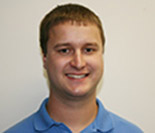Pi Chi Omega Awards Four Scholarships for 2017
Pi
Chi Omega, the national entomology fraternity is happy to announce the 2017
recipients of the Pi Chi Omega scholarships. Recognizing the need for college
educated professionals in the field of urban and industrial pest management, Pi
Chi Omega makes available scholarships each year to students majoring in urban
and industrial pest management or some closely related plan of study. This
year, 4 scholarships were awarded: 1 for $3,000 and 3 for $2,000 each. "The
object of our scholarships is to encourage and assist outstanding students to
prepare for careers in pest control", said Judy Black, Pi Chi Omega President.
 The $3,000 Osmund Scholarship was awarded to Mark
Janowiecki from Texas A & M who is currently a PhD Entomology student under
Dr. Ed Vargo. Mark’s dissertation research, will investigate inter- and
intraspecific subterranean termite colony interactions. Specifically, his objectives
include examining the process of how termite colonies detect nearby colonies,
how they distinguish same from unique colonies, and their reactions to opposing
colonies.This project will help to better understand the general biology
of subterranean termites. It also has the potential application to pest control
by potentially manipulating these mechanisms of termite recognition and
avoidance.
The $3,000 Osmund Scholarship was awarded to Mark
Janowiecki from Texas A & M who is currently a PhD Entomology student under
Dr. Ed Vargo. Mark’s dissertation research, will investigate inter- and
intraspecific subterranean termite colony interactions. Specifically, his objectives
include examining the process of how termite colonies detect nearby colonies,
how they distinguish same from unique colonies, and their reactions to opposing
colonies.This project will help to better understand the general biology
of subterranean termites. It also has the potential application to pest control
by potentially manipulating these mechanisms of termite recognition and
avoidance.
Mr. Janowiecki received his B.S. degree in
Entomology from Ohio State University, under Dr. Susan Jones. He received his
M.S. degree in Entomology from University of Arkansas, under Dr. Allen
Szalanski. He has extensive experience giving presentations at scientific
meetings, as well as extension presentations to meetings of pest management
associations.
 Sudip Gaire, a PhD student in Entomology (Urban Pest Management)
at Purdue University is the Founder’s Scholarship Award Recipient in the amount
of $2,000. Sudip’s dissertation research under Dr. Ameya Gondhalekar focuses on
the toxicity and neurophysiological impacts of essential oils on Bed bugs. He received a B.S. degree from Tribhuvan
University in Nepal. He followed that up with an M.S. degree in Agricultural
Biology, with a research specialization in Urban Entomology from the University
of New Mexico under Dr. Alvaro Romero.
Sudip Gaire, a PhD student in Entomology (Urban Pest Management)
at Purdue University is the Founder’s Scholarship Award Recipient in the amount
of $2,000. Sudip’s dissertation research under Dr. Ameya Gondhalekar focuses on
the toxicity and neurophysiological impacts of essential oils on Bed bugs. He received a B.S. degree from Tribhuvan
University in Nepal. He followed that up with an M.S. degree in Agricultural
Biology, with a research specialization in Urban Entomology from the University
of New Mexico under Dr. Alvaro Romero.
 Also studying at Purdue University, Aaron Ashbrook, is a
recipient of one of the $2,000 scholarships from Pi Chi Omega. Aaron is a PhD student in Entomology studying
under Dr. Ameya Gondhalekar. His research seeks to address the significant
knowledge gap associated with the long-term usage of heat as a control
technique for bed bugs. Aaron earned his
B.S. in Biology from Grand Valley State University. He also earned his M.S. in Entomology under
Drs. Gary Bennett and Ameya Gondhalekar.
Also studying at Purdue University, Aaron Ashbrook, is a
recipient of one of the $2,000 scholarships from Pi Chi Omega. Aaron is a PhD student in Entomology studying
under Dr. Ameya Gondhalekar. His research seeks to address the significant
knowledge gap associated with the long-term usage of heat as a control
technique for bed bugs. Aaron earned his
B.S. in Biology from Grand Valley State University. He also earned his M.S. in Entomology under
Drs. Gary Bennett and Ameya Gondhalekar.
 Annie Rich, the only M.S. student receiving a
scholarship this year, received one of the $2,000 scholarship awards. Annie is
majoring in medical and veterinary entomology at the University of Georgia
under Dr. Nancy Hinkle, where her research focuses on the interface of urban
pest suppression and medical entomology, specifically on bloodsucking pests and
disease vectors. Her research is oriented toward solving problems affecting
human health and comfort. She also has a
passion for extension education.
Annie Rich, the only M.S. student receiving a
scholarship this year, received one of the $2,000 scholarship awards. Annie is
majoring in medical and veterinary entomology at the University of Georgia
under Dr. Nancy Hinkle, where her research focuses on the interface of urban
pest suppression and medical entomology, specifically on bloodsucking pests and
disease vectors. Her research is oriented toward solving problems affecting
human health and comfort. She also has a
passion for extension education.
Stephanie Hill, Chairman of the Pi Chi Omega
Scholarship Committee, said of the process, "Our committee had a very difficult
job choosing the four award recipients from a very qualified pool of 8
applicants. It is a great problem to have . . .seeing this many students
pursuing important research in the field of urban and industrial pest control.
To be eligible, students must be currently
enrolled full-time in undergraduate or graduate studies in urban or industrial
pest management or a related field. The award is based on: the student being in
good academic standing (3.0 or better on a 4.0 scale); and on character,
personality, school activities, and professional activities.
Applicants must submit a completed application
form; resume or curriculum vitae; an official transcript from the school
currently attending; a one page essay describing how their studies, research,
and/or work experience will contribute to the urban and industrial pest management
industry; two letters of recommendation; and a letter of support from a Pi Chi
Omega member.
 The $3,000 Osmund Scholarship was awarded to Mark
Janowiecki from Texas A & M who is currently a PhD Entomology student under
Dr. Ed Vargo. Mark’s dissertation research, will investigate inter- and
intraspecific subterranean termite colony interactions. Specifically, his objectives
include examining the process of how termite colonies detect nearby colonies,
how they distinguish same from unique colonies, and their reactions to opposing
colonies.This project will help to better understand the general biology
of subterranean termites. It also has the potential application to pest control
by potentially manipulating these mechanisms of termite recognition and
avoidance.
The $3,000 Osmund Scholarship was awarded to Mark
Janowiecki from Texas A & M who is currently a PhD Entomology student under
Dr. Ed Vargo. Mark’s dissertation research, will investigate inter- and
intraspecific subterranean termite colony interactions. Specifically, his objectives
include examining the process of how termite colonies detect nearby colonies,
how they distinguish same from unique colonies, and their reactions to opposing
colonies.This project will help to better understand the general biology
of subterranean termites. It also has the potential application to pest control
by potentially manipulating these mechanisms of termite recognition and
avoidance. Sudip Gaire, a PhD student in Entomology (Urban Pest Management)
at Purdue University is the Founder’s Scholarship Award Recipient in the amount
of $2,000. Sudip’s dissertation research under Dr. Ameya Gondhalekar focuses on
the toxicity and neurophysiological impacts of essential oils on Bed bugs. He received a B.S. degree from Tribhuvan
University in Nepal. He followed that up with an M.S. degree in Agricultural
Biology, with a research specialization in Urban Entomology from the University
of New Mexico under Dr. Alvaro Romero.
Sudip Gaire, a PhD student in Entomology (Urban Pest Management)
at Purdue University is the Founder’s Scholarship Award Recipient in the amount
of $2,000. Sudip’s dissertation research under Dr. Ameya Gondhalekar focuses on
the toxicity and neurophysiological impacts of essential oils on Bed bugs. He received a B.S. degree from Tribhuvan
University in Nepal. He followed that up with an M.S. degree in Agricultural
Biology, with a research specialization in Urban Entomology from the University
of New Mexico under Dr. Alvaro Romero. Also studying at Purdue University, Aaron Ashbrook, is a
recipient of one of the $2,000 scholarships from Pi Chi Omega. Aaron is a PhD student in Entomology studying
under Dr. Ameya Gondhalekar. His research seeks to address the significant
knowledge gap associated with the long-term usage of heat as a control
technique for bed bugs. Aaron earned his
B.S. in Biology from Grand Valley State University. He also earned his M.S. in Entomology under
Drs. Gary Bennett and Ameya Gondhalekar.
Also studying at Purdue University, Aaron Ashbrook, is a
recipient of one of the $2,000 scholarships from Pi Chi Omega. Aaron is a PhD student in Entomology studying
under Dr. Ameya Gondhalekar. His research seeks to address the significant
knowledge gap associated with the long-term usage of heat as a control
technique for bed bugs. Aaron earned his
B.S. in Biology from Grand Valley State University. He also earned his M.S. in Entomology under
Drs. Gary Bennett and Ameya Gondhalekar. Annie Rich, the only M.S. student receiving a
scholarship this year, received one of the $2,000 scholarship awards. Annie is
majoring in medical and veterinary entomology at the University of Georgia
under Dr. Nancy Hinkle, where her research focuses on the interface of urban
pest suppression and medical entomology, specifically on bloodsucking pests and
disease vectors. Her research is oriented toward solving problems affecting
human health and comfort. She also has a
passion for extension education.
Annie Rich, the only M.S. student receiving a
scholarship this year, received one of the $2,000 scholarship awards. Annie is
majoring in medical and veterinary entomology at the University of Georgia
under Dr. Nancy Hinkle, where her research focuses on the interface of urban
pest suppression and medical entomology, specifically on bloodsucking pests and
disease vectors. Her research is oriented toward solving problems affecting
human health and comfort. She also has a
passion for extension education.